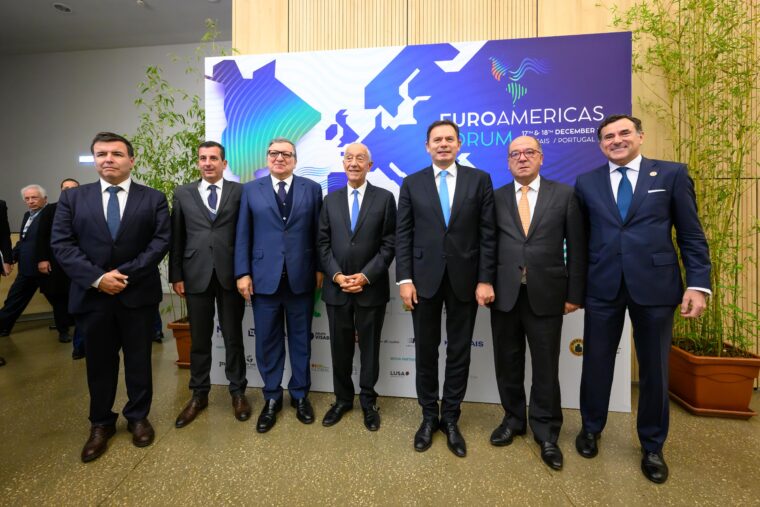Portuguese people who stand out abroad are helping to find out where business opportunities are and what kind of companies and activities the country can attract. An initiative that brings together Negócios and the Portuguese Diaspora Council.
1- What led you to leave Portugal?
From an early age I showed a desire to live outside Portugal. I did my studies, first in Portugal and soon after I went to the United Kingdom where I stayed for a few years, but always wanted to go to other countries. Afterwards, I was in the Netherlands, also for academic reasons, and then in Paris. Several professional and academic experiences followed in several European and Central American countries and, since 2015, I have been in Brazil, where I came for professional reasons. My motivation has always been linked to the desire to interact with new cultures and expand my horizons. Furthermore, working in other countries, being in another country, sharpens our curiosity, observation, tolerance and a better understanding of ourselves and the world around us.
2- What advantages or disadvantages did being Portuguese bring you?
I have had different experiences, depending on the country I have been to, but, in general, I have always seen advantages in being Portuguese. I would highlight the Portuguese talent that is recognized for its excellence, whether because we speak other languages well, or because of the academic excellence of its universities, but also, and mainly, for the openness and flexibility we present when faced with challenges. I think these are qualities that are recognized throughout the Portuguese diaspora.
3- What obstacles did you have to overcome and how did you do it?
Since I have been in Brazil, I have experienced many challenges, but also several opportunities. Brazil is a country of continental size, with many opportunities and, therefore, exciting. However, this magnitude can bring a lack of focus on a company’s growth strategy. It is very important to focus and look at Brazil as a long-term market. There are some cultural differences in the way business is done, which are important to note. The relational part is highly valued in Brazil. When doing business, it is very important to invest in relationships, so that we can build a long-term context of trust. The tax, legal and financial complexity is daunting at first, but later, with good local partners in different areas, we were able to overcome these difficulties. On the other hand, although we speak the same language, Brazilians often do not understand what we say, as we tend to speak faster and ignore some vowels (it is, in fact, important to pronounce vowels in a more open way). In general, I have learned a lot from my experience and work in Brazil.
4- What do you admire most about the country you’re in?
The Brazilian economy has shown, over time, a remarkable capacity for resilience in times of crisis. The way Brazilian companies adapt and survive in challenging economic scenarios is something that I admire and consider to be valuable for many companies in the world, particularly Portuguese ones. The enormous cultural and market diversity, which leads to a variety of products and services adapted to different audiences, reflects Brazilian creativity.
People’s contagious joy and positivity and the immense opportunities that exist throughout the country are also fundamental; as well as cultural diversity through arts, music, historical and natural heritage, which are so distinct in each Brazilian state. I have been close to projects in the Amazon, the largest tropical forest in the world, the largest freshwater reservoir, and the most complex ecosystem on Earth, which I consider to be Brazil’s greatest wealth. As Jorge Bem Sor says, in an ode to Brazil and its people: “I live in a tropical country, blessed by God and beautiful by nature (but what beauty!)”.
5- What do you admire most about your company/organization?
I am currently co-founder and CEO of Beta-i Latam, which is a global collaborative innovation consultancy. We started our activity in Brazil at the end of 2019, using bootstrapping, and we have managed to grow at a positive pace over the last almost 4 years. I like working with innovation, ventures and the ecosystem of entrepreneurs and startups. Brazilian companies are very willing to work on open innovation with startups from around the world, something that is an opportunity for Portuguese startups that want to internationalize. I have seen a movement of Brazilian startups establishing themselves in Portugal to internationalize their business, not only for the Portuguese market, but also as a platform for Europe and Africa. A great opportunity for trade and investment between Portugal and Brazil.
6- What recommendations would you give to Portugal and its entrepreneurs and managers?
Brazil is one of the largest markets in the world. It is a country with several challenges, but with many opportunities. Brazil has never been as close to Portugal as it is today, and that is why it is time for Portuguese companies to look at Brazil as a market for their services and products. Portuguese businesspeople must look at Brazil as a long-term market, adopting an attitude of active listening and, in a way, humility, without ever losing focus and ambition. There are some areas that are fundamental to understanding Brazil, the most important part being creating a strong network and local partnerships that allow you to scale in the market. The role of the Portuguese diaspora in Brazil is very relevant, as we advisors are available to help Portugal and its companies, entrepreneurs, cultural and academic organizations to be successful, sharing our experience and helping, as far as possible, to enter the market Brazilian.
7- In which sectors of the country where you live can Portuguese companies find clients?
Brazil has global players in key sectors such as agriculture, paper pulp, cosmetics, food and beverages and technology, who are buyers of goods and services and, more recently, investors in startups via their Corporate Venture Capital. Brazil has the potential to lead the nature based solutions market. In this context, Portuguese companies that can contribute have gigantic market potential.
8- In which sectors in Portugal might companies from the country where you reside want to invest?
Portugal is small in size compared to Brazil; however, it has the advantage of being a base for Europe and Africa. There are several sectors that Brazil is already looking at and investing in: among them, real estate, tourism, wines, agriculture. In the industrial area, there is great potential that deserves a more focused investment attraction plan – both at the level of greenfield investment (for example in areas related to the energy transition) and in Portuguese industries in the areas of textiles, footwear, ceramics. There is also a potential to attract HNWI to invest in infrastructure projects, VCs linked to startups and other relevant projects. I believe that Brazilian companies look for companies that already have a footprint in other European countries, so that they can scale quickly in Europe.
9- What is the competitive advantage of the country you are in that could be replicated in Portugal?
One of the biggest advantages that the Brazilian market has is the mindset of its people. Brazilian businesspeople are ambitious and very resilient – they know that to be competitive you have to work hard and make mistakes to get it right. In a way, there is a very entrepreneurial spirit in Brazil, which in my opinion is inspiring. The Brazilian financial sector is also very sophisticated, and this can be seen not only in its banking system, but, especially recently, in its fintech ecosystem, which is one of the most relevant in the world.
10- Do you consider going back to Portugal? Why?
I go to Portugal twice a year with my family and I really like Portugal. I will definitely return one day. For now, I like being in Brazil – my mission here is not over yet. However, I want to be close to Portugal to help further strengthen its relationship with Brazil.
Read the original article here.






